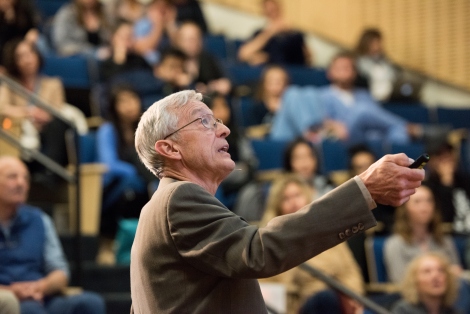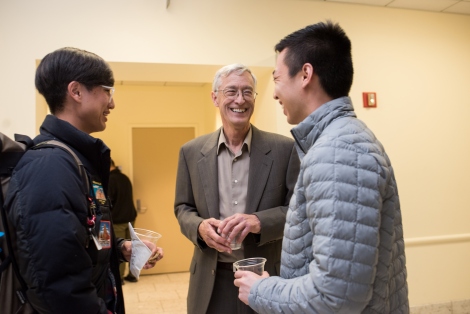David Graham Shares Life Lessons from Dentistry in 2018 UCSF Last Lecture
Healing tooth decay can inspire life lessons and serve as a reminder of the darker elements of human nature. So said David Graham, DDS, professor of preventive and restorative dental sciences and a 1971 alumnus of the UC San Francisco School of Dentistry, during the 2018 UCSF Last Lecture.
In an annual tradition for the past seven years, hundreds of students across the UCSF campus voted for a faculty member to deliver a lecture in response to the question: “If you had but one lecture to give, what would you say?” Graham, this year’s winner, gave his lecture in Cole Hall on April 11.
Ever the enthusiastic teacher, Graham couldn’t resist the opportunity to educate the non-dental professionals in the audience about a fundamental dental procedure: how to prepare a decayed tooth for a filling. He used the standardized surgical principles to chart the trajectory of his life and career, and the insight he has acquired in his 73 years.
In Dentistry as in Life: Change and Decay
The first step of the filling procedure is to outline the area of decay on the tooth, an outline that can change throughout the drilling process. Graham expanded that concept to life: “We all have plans and goals for our life. Be prepared: they are going to change,” he said. “You have to be able to adapt to that.”
A vivid example of plans that dramatically changed in his own journey was winning a lottery no one wanted to win.

Graham’s birth date, September 14, was the first number drawn by the US Selective Service System’s call to military service in 1969, when Graham was a dental student. Rather than being drafted, he enlisted in the US Navy. After graduation, that decision led him to serve as a dental officer for 18 months at Mare Island in Vallejo, then aboard an aircraft carrier in the Pacific during the Vietnam War, where he learned about extracting wisdom teeth on the fly and the importance of knowing personal limits even in the face of life and death situations.
In his lecture, Graham then walked through the steps of cavity preparation, including those that remove deep decay and impart strength to the tooth, as metaphors for issues of morality and ethics.
“I’ve noticed in recent years a big increase in moral degradation in our society. This decay seems to be getting deeper and deeper,” he said, noting a “me-first” attitude spanning multinational corporations, politicians and the healthcare professions. He elaborated upon the “bad eggs” in healthcare professions, whose actions include fraudulent billing and unnecessary procedures being performed.
“We need to remove this moral decay and I hope you will help me,” he said, by using peer review or state board action if necessary. Graham said he was proud to have been an expert witness in the prosecution of a dentist who was creating fake cavities in patients and performing unnecessary crowns and root canals.
He urged future practitioners to practice the Golden Rule.
“As a practitioner, I recommend that you be sincere, be humble, treat others as you would yourself,” he advised. “Go the extra mile for your patients.”
Lessons in Compassion

Graham’s talk was peppered with stories from his youth and military career that shaped his own life and the lessons he tries to pass on to his students.
Growing up in Palo Alto, Graham said he always preferred “tinkering” to studying and seemed destined to become a dentist. When he was 12, he used his paper route earnings to purchase a power drill, which he proceeded to test in all the studs of the garage. “I found out I liked drilling holes,” he said. “And it’s still with me.”
He said his decision to keep teaching throughout his career has been the best decision of his life and shared the experience that developed his compassionate approach to teaching.
In his first quarter of dentistry school, his father died of a heart attack at age 58, and he had to miss a week of school. When he returned to a grueling anatomy oral exam, his professors let him off the hook with an easy question. That experience taught him empathy and compassion for his students, who may be dealing with any manner of adversity, from family issues to threat of deportation. “We have all these very smart students and they can get over hardships,” he said. “We just have to help them.”
Appreciating the Highlights
The last step in filling a cavity is to smooth the surface and then assess the work – maybe even admire it. Graham used that step as an opportunity to look back over the highlights of his life and to appreciate his career at UCSF.
“If it had not been for my career at UCSF, I would not have taught over 4,000 such intelligent and appreciative students who have kept me feeling young,” he said. He also would not have experienced his claim to fame: appearing on the TV show “MythBusters” to debunk Lucille Ball’s claim that she could receive radio signals through her teeth.
In closing, Graham summed up his advice: welcome challenges, keep an open mind and continue learning, enjoy life outside your profession and above all, love and cherish your family.
“Always appreciate and thank those who help you,” he said, listing a host of unsung heroes in his profession. “They are part of your family.”